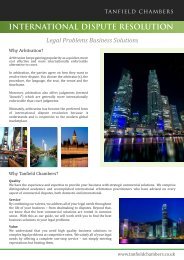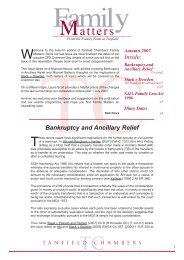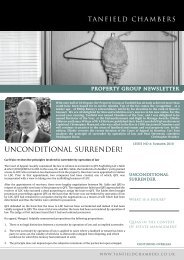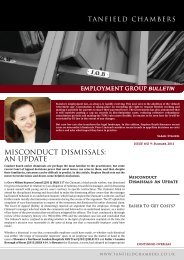Link to newsletter - Tanfield Chambers
Link to newsletter - Tanfield Chambers
Link to newsletter - Tanfield Chambers
Create successful ePaper yourself
Turn your PDF publications into a flip-book with our unique Google optimized e-Paper software.
Paul Stevenson<br />
Paul Stevenson has a thriving and diverse<br />
employment practice and frequently appears<br />
in employment tribunals at every stage from<br />
review hearings and pre-hearing reviews<br />
through <strong>to</strong> final hearings. Paul has wideranging<br />
experience of advising and drafting<br />
particulars of complaint and resistance in all<br />
manner of employment claims from unfair dismissal <strong>to</strong> age and<br />
disability discrimination. He has also advised on compromise<br />
agreements and restrictive covenants. Recent experience includes<br />
providing advice <strong>to</strong> and appearing for both Claimants and<br />
Respondents in redundancy claims where TUPE and the Working Time<br />
Regulations were engaged. When away from his desk, Paul is the chair<br />
of a charity working in west Africa and provides advice and assistance<br />
<strong>to</strong> a student publishing company in Oxford. He enjoys good food,<br />
pho<strong>to</strong>graphy, politics, reading and travel.<br />
These provisions cover any sums which a worker would normally<br />
expect <strong>to</strong> be paid in connection with his/her employment and where<br />
the <strong>to</strong>tal amount of wages paid on any occasion is less than the <strong>to</strong>tal<br />
amount properly payable on that occasion. Where a worker is faced<br />
with such a deduction it is extremely important that they have<br />
recourse <strong>to</strong> their contract of employment in order <strong>to</strong> see what it<br />
permits.<br />
To be entitled <strong>to</strong> pay, the employee must show that he/she has<br />
worked or is willing <strong>to</strong> work for it: the governing authority is Miles v<br />
Wakefield Metropolitan District Council [1987] I.C.R. 368. Albeit<br />
obiter, Lord Brightman expressly differentiated between the facts of<br />
that case and what he referred <strong>to</strong> as “a failure <strong>to</strong> work, or work<br />
efficiently, as a result of illness or other unavoidable impediment, where<br />
special considerations apply”. He plainly did not envisage the<br />
nationwide inability <strong>to</strong> attend work which we saw earlier this year. It<br />
will be a question of fact in any case whether an employee was willing<br />
<strong>to</strong> work. Given, however, that many parts of the country were subject<br />
<strong>to</strong> warnings not <strong>to</strong> travel if at all possible employers should be aware<br />
that it would be difficult <strong>to</strong> argue that a snowbound employee was<br />
unwilling <strong>to</strong> work.<br />
If an employer attempts <strong>to</strong> make a deduction purportedly in<br />
accordance with a contractual provision, the terms of the contract<br />
must have been shown <strong>to</strong> the worker or, if not made in writing, its<br />
effect must have been notified <strong>to</strong> the worker before the deduction is<br />
made: see the ERA 1996, ss. 13(2), 15(2).<br />
An employee faced with a deduction from wage should seek speedy<br />
legal advice because much will depend on the factual circumstances of<br />
their employment contract. The complaint ought <strong>to</strong> be presented<br />
within three months beginning with the date of the deduction of<br />
which complaint is made.<br />
Childcare<br />
In a related concern, the closure of thousands of schools gave many<br />
parents unexpected daytime childcare concerns. So what approach<br />
can an employee expect<br />
As a general rule, employees have the right <strong>to</strong> take reasonable unpaid<br />
leave <strong>to</strong> deal with unexpected disruption or termination of<br />
arrangements for the care of a dependant: ERA 1996, s. 57A(1).<br />
Statu<strong>to</strong>ry protection does not, however, compel an employer <strong>to</strong> give<br />
time off <strong>to</strong> allow an employee personally <strong>to</strong> provide care beyond the<br />
reasonable amount necessary <strong>to</strong> deal with the immediate crisis. There<br />
would, however, be an argument that where a school closure is not<br />
announced until the last minute an employee could seek statu<strong>to</strong>ry<br />
protection for taking the full day off. The amount of time which is<br />
reasonable depends on all the circumstances and an employee should<br />
inform the employer as soon as reasonably practicable and state how<br />
long he/she expects <strong>to</strong> be absent.<br />
A guideline approach<br />
Employers should develop a clear extreme weather policy which sets<br />
out, in advance, what is expected of both parties. The overriding<br />
concern for an employer should be <strong>to</strong> ensure that a consistent<br />
practice is applied across their workforce.<br />
Employers should take a balanced approach and should bear in mind<br />
that they have a duty of care <strong>to</strong> their employees <strong>to</strong> see that employees<br />
are not subjected <strong>to</strong> any unnecessary risk of injury and should<br />
consider the possible liability attached <strong>to</strong> forcing an employee <strong>to</strong><br />
travel when it would be unsafe.<br />
Any policy should emphasize that employees have a contractual duty<br />
<strong>to</strong> attend work and that, where possible, employees should take all<br />
reasonable steps <strong>to</strong> attend work and should keep in regular contact<br />
with their employer. Alongside encouraging flexible/home working<br />
where possible, employers should foster a culture of advance<br />
planning, particularly in matters relating <strong>to</strong> child care and should<br />
consider options such as reasonable unpaid leave <strong>to</strong> cover child care.<br />
The policy should make clear provision for early closure of a<br />
workplace where appropriate. If employees who cannot make it <strong>to</strong><br />
work will be required <strong>to</strong> take a day’s leave as part of their holiday<br />
entitlement this should be unambiguous. A timely reminder of a<br />
definite policy such as this whenever snow falls might mean that<br />
employees tempted <strong>to</strong> be ‘unable’ <strong>to</strong> travel <strong>to</strong> work are suddenly able<br />
<strong>to</strong> make it.<br />
PAUL STEVENSON<br />
W W W. TA N F I E L D C H A M B E R S . C O . U K



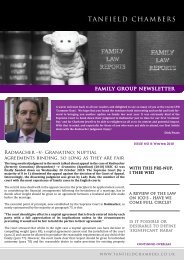


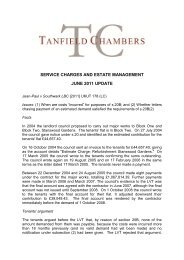
![Re Clarise Properties Ltd [2012] UKUT 4 (LC) - Tanfield Chambers](https://img.yumpu.com/36301708/1/190x245/re-clarise-properties-ltd-2012-ukut-4-lc-tanfield-chambers.jpg?quality=85)


